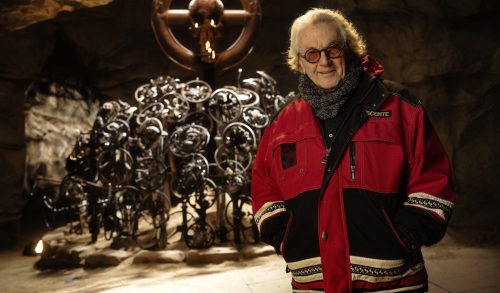The FilmLight Colour Awards 2024 jury recently gathered ahead of casting their final votes for this year’s nominees. During the discussion, George Miller, 2024 Jury Guest of Honour, talked to Jury President, Mandy Walker, and other jurors, about his evolving relationship with colour.

Telling stories
“Cinema is always changing,” says Miller. “I think the big advance in cinema, after its language was defined by the silent filmmakers, was when sound came along. And then, one could argue, the next big shift was the digital revolution.”
Miller said the biggest attraction to the cinema for him was to be able to help to tell stories, followed by two other interests.
“Two things I’ve always been interested in. First, the shift in the syntax of cinema and, second, the tools and technology available to us,” says Miller. “I feel very fortunate that I’m still curious about filmmaking, while working in this digital age. I remember, during the celluloid era, going to labs and engaging with the colourists who, at the time, worked with very limited tools. Back then I was astonished by what they could do. But we never imagined we’d have the ‘plasticity’ of the image available to us today.”
Discovering the power of the colourist
During the discussion, Miller recalled meeting up with cinematographer Andrew Lesnie during the making of Lord of the Rings, where he truly realised the significance of the role of the colourist in the filmmaking process.
“I remember a moment when it really struck me how significant the colourist’s role is. I was with Andrew Lesnie, who was shooting Lord of the Rings. We were in Wellington and he took me to the DI suite, which was just a room with a few computers, and he said, ‘what’s happening here is that we’re not only grading the movie, but Peter is using it as his final pass of the film in terms of VFX.’ I remember the shot included horses riding along a river and they all had red eyes, which he did in the DI. He was not only colouring the film, he was also doing digital effects. It was a huge thing.”
Fury Road
“I’ve been very lucky to travel along with the technology, doing animations like Happy Feet and then on to Fury Road over a decade ago,” adds Miller. “The Fury Road cinematographer, John Seale, who came out of retirement for the film, was a pioneer in terms of using gels and all sorts of filters in camera. He is a great operator, he loved the practical element and here he was, shooting his first digital film, on a digital camera. What really struck me, despite his age and experience, was how well he adapted. It really blew me away.
“As he went through the process, getting involved intimately with the colourist, he was so excited. He said, ‘you know, I think the day will come, when people will recognise the colourist hand-in-hand with the cinematographer’.”
Cinematography, visual effects, colour
“And now, a decade later, I am having the same experience with visual effects,” adds Miller. “The overlap between cinematography, visual effects and colour is much more effective today than it was. And it’s a lovely moment because it’s so holistic. If we can break down the silos, we will see it evolving even more. It’s happening so quickly and it’s such a wonderful thing.”
Colourist as the nexus
“The other person who really turned me on to the potential of colour was Jean-Pierre Jeunet,” adds Miller. “I remember he said one of his favourite moments making movies was at the end, sitting in a theatre with the colourist in Paris for two weeks – I think it was on Amelie – and it was the most joyous two weeks of his film making. I have come to experience this, too.
“For the films I work on, we tend to get the colourist involved early, really forging the path for the visual effects. The biggest problem, I think, with visual effects, is that it can be so widespread – people from all over the planet are working on it – usually spending a lot of time on a specific series of shots. With this, there’s a risk of losing cohesion and the colourist is the nexus of all these interactions.
“This is why I am so excited to be doing this and seeing all the wonderful work that is being done across so many different platforms and media – it is a very significant moment and one that will develop even more.”



